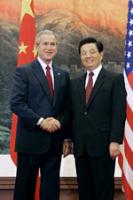A face off between the world’s largest greenhouse-gas spewers has taken center stage at the UN Climate Change Conference in Bali, and China appears to be winning its public-relations battle with the U.S.
China has reiterated it will not consider mandatory emissions cuts until the U.S. and other industrialized countries such as Canada embrace a less-extravagant lifestyle. The U.S. is standing pat in its opposition to mandatory limits.
Although both countries have dug in their heels, China, which many believe has already surpassed the U.S. as the world’s top emitter of heat-trapping gases, is now seen as playing a constructive role on global warming after years of dodging the issue.
In that scenario, the U.S. is losing friends fast.
Instead of mandatory cuts, the Bush administration wants individual countries to set their own goals. It also favors private-sector initiatives to develop energy-saving technology and alternative sources such as ethanol, and says industry should devise ways to burn coal and other fossil fuels more cleanly.
The U.S. rejected Kyoto, which commits three dozen industrialized countries to cut their greenhouse gases an average of 5 percent below 1990 levels between next year and 2012, largely because developing countries such as China, India and Brazil were not required to cut emissions.
Though it also rejects binding cuts, China has expressed support for a post-Kyoto agreement and used the Bali conference to show it is doing something to address climate change, like boosting renewable energy use to 10 percent by 2010 and improving efficiency by 20 percent. It also has launched a massive tree planting program and rolled out a national climate change policy.
U.S. climate chief Harlan Watson has denied the U.S. feels isolated at Bali , but European nations have nevertheless vowed to boycott U.S.-led climate talks next month unless Washington accepts a range of numbers for negotiating deep reductions in global-warming emissions, and Canada has agreed to accept mandatory targets and work with the UN on worldwide greenhouse-gas reductions.
Noting the bitter divisions at Bali, former Vice President Al Gore urged delegates to adopt an open-ended deal that could be enhanced after the Bush Administration leaves office and United States policy changes.
There’s no question any climate-change accord is meaningless without the participation of China, India and other developing countries. But it’s also meaningless without the U.S., which would be in a far better position to persuade other emitters to take on greater commitments if it had shouldered its own responsibilities.
Subscribe to our newsletter
Stay up to date with DeSmog news and alerts







